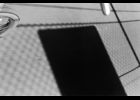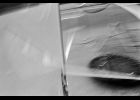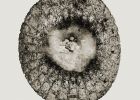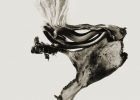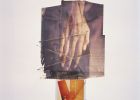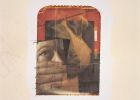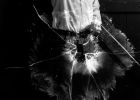“Documentar algo que no existe”: los modelos discursivos como apparatus en Vampyroteuthis Infernalis
The concept of “apparatus”, proposed by Vilém Flusser in his Towards a Philosophy of Photography, implies an analysis of the “production logic” of the artistic work, which Flusser proposed thinking about photography. However, this concept also offers a possibility of reading his Vamyproteuhis Infernalis as a rebellion against the discursive rules that themselves work as an “apparatus” . By questioning the rules of scientific, philosophical, didactic and literary discourses, Flusser plays with the mechanisms of the discourse and deactivates their automatisms. This leads to questions like the boundaries of art, creation as a form of knowledge, or imitation and scientific study of reality as a need in artistic, literary creation, and methodologies of “scientific creation”.
Interview
In this interview, Fred Forest, Jean-Louis Poitevin and Martial Verdier, discuss the relationship between Fred Forest and Vilém Flusser, their collaboration over the years and the influence they had on each other’s work and thinking. Verdier was at one time Forest’s assistant; he is now Secrétaire Général of TK21 and has recorded and edited the discussion. The interview begins with their first meeting between Forest and Flusser and the person of Flusser himself. It then moves on to a major field of collaboration: gestures (ca. 4.38) and the role of dialogue and intersubjectivity (ca. 5.55). They also discuss the notion of apparatus (ca. 9.00), video (ca. 17.25) and the group “Art Scociologique” (ca. 20.25 and again ca. 37.40). Forest talks about the dissolution of the group and about one of his members Hervé Fischer (ca. 38.30) (see the interview with Fischer in this issue). Verdier questions Forest about Flusser’s impact on his work and the way he himself influenced Flusser’s thinking (ca. 29.30). The very last question concerns the future of art. The situation today, Forest says, is tragic, but there is also hope for “a return to more honest, profound and valuable” things.
Password: Flusser
Appareil et caméras chez Vilém Flusser, objections et critique
For Vilém Flusser, apparatus is a term of primary importance. Key to the post-historical age, it tends to designate a programmed functioning within which the players or functionaries, that we will be from now on, are activated. The problem is to define such a notion, Flusser relies on a questionable conception of photography and of the “photographable.” The point of this paper is not to consider, as Flusser puts it, what can be “left for us,” but to consider more optimistically what can be done “with” the new recording devices. Considering that history is not finished, we will propose, following the suggestions of Walter Benjamin, to think of technique as open to a less regulated, freer and potentially more critical understanding.
Reversing the vectors of meaning. The diagrammatic language of Vilém Flusser
According to his own cultural analysis, Flusser was a man of yesterday. He, who wrote nearly every day of his life, was himself subject to the “textolatry” of modernity. A modernity, though, which would soon shift into a new epoch which Flusser and others had given similar names: post-histoire, post- modernity, information or telematic society. In this new situation, according to Flusser, written text would become a marginal code, soon to be superseded by the “technical image” as universal means of communication and information storage. Thus, Flusser described authors like himself, which would stay engaged with text, as “the new illiterates” of the upcoming age. But although Flusser was a man of the written word, I will argue that there was at least one type of sign system with which he also operated frequently and which can be linked to his image heuristics: the diagram. Scattered over his manuscripts, letters and notes, over 160 diagrammatic sketches can be found in the Vilém Flusser Archive. Compared to the thousands of documents in the archive, this seems to be a small number. But his diagrammatic sketches are not only interesting considering the nearly exclusively textual character of Flusser’s legacy; they can also be described as Flusserian technical images. According to the semiotic definition of the diagram by Charles S. Peirce, diagrammatic signs constitute a specific subclass of the icon: A diagram resembles its object not by visual but structural similarity. By drawing a diagram, one proposes a hypothesis about the structure of its object, thus manifesting an abstract concept as a concrete sign. Here we come close to Flusser’s notion of technical images as projections of abstract models. Following up on this comparison, the paper pleas for a non-trivial relation between Flusser’s heuristic of the technical image and his diagrammatic practice.
Libertad y poshistoria en la filosofía de la fotografie de Vilém Flusser
The object of this research is to trace Flusser’s thoughts on freedom and history as they appear in his philosophy of photography. The investigation focusses on the function of the author of the photograph in relation to apparatuses and programs. It extends, as I will try to show, to the activity of the spectator and of everyone who interacts with images. I follow Flusser’s methodology, which is to relate the philosophy of photography to the theory of games. And that's why I speak about the player, the toy and the game involved in photography. I think Flusser's main inspiration was Wittgenstein of the Tractactus and his theory of the emancipation of meaning from truth or factual falsity. Here I find the ontological key to his philosophy of photography as a philosophy of freedom.
Rethinking Interology with Flusser
Motivated as much by a deep concern with the rapidly evolving human condition as by intellectual curiosity, this article reveals the problem-driven and futurological nature of Flusserian interology [Deleuze]. It proposes that compared to traditional ontology, the notion of interality and the dynamics of interology offer us a more adequate way of thinking through our situation in the here and now and in the immediate future. The secondary motive is to turn Flusser’s media philosophy into a pointillist verbal art, a techno-ethics, and an intertopia befitting the digital era.
Flusser et les photographes, les photographes et Flusser / Flusser and photographers, photographers and Flusser / Flusser e os fotógrafos, os fotógrafos e Flusser
The concept of experimental photography has rarely been defined, nor has it been the subject of much research in studies of contemporary photography. Vilém Flusser is one of the few writers who, in his book Towards a Philosophy of Photography, proposed a definition of experimental photography as “playing against the apparatus”, i.e. the practice of some photographers who do not abide by the rules of photography and perturb the standard operations of the apparatus by playing against the camera. Aside from this conceptual definition, Flusser himself gave few examples of this practice, principally Andreas Müller-Pohle and Joan Fontcuberta. While expanding this definition, this essay sheds light on contemporary photographers whose work can be qualified as experimental in this respect. Some deconstruct the camera, reinventing it or photographing without a lens (pinhole) or even without a camera (photograms). Some undo the image creation process, playing with time, with light, with the chemical development process or with image printing. And some redefine the author-photographer, erasing him or giving him a different role in the photographic process. Contemporary experimental photography is not a school, nor a movement, but simply a current, a moment between the decline of traditional documentary analog photography and the rise of digital photography.
The Free Will Impasse
This essay discusses the concepts of entropy and negentropy used by Vilém Flusser in his philosophy of photography to delineate connections between science and art. If the act of finding order within chaos has always been a quality specific to human beings, the overwhelming role machines hold in our society casts shadows on human agency. Since the Enlightenment, humankind has carried on a regimentation of nature with the goal of finding a way of theorizing everything within it. In the same way, empirical sciences have studied and portrayed the world of phenomena according to the laws of the moment. Shifting from prejudice to prejudice, however, they have never succeeded in finding an all-inclusive theory. Their way of systematization was adapted to all other areas of life, imposing itself through the norms of capitalism and production, leaving little space for human beings. In this scenario, human beings become puppets or tools. In this context, the arts are called upon to develop viable strategies to counteract the overwhelming power of social and technological control.
Até a terceira e a quarta geração: a experiência do holocausto como fundamento das teorias de Vilém Flusser / Unto the Third and Fourth Generation. The Experience of the Holocaust as the Basis of Vilém Flusser’s Philosophy / Do třetího i čtvrtého pokolení
This essay focuses on the fundamental significance of the Holocaust in Vilém Flusser’s life and thinking. In his still unpublished Até a terceira e a quarta geração (Unto the Third and Fourth Generation) written in the early 1960ies, the problem of Nazism is explicitly thematized and linked to the development of Western society. The abandonment of a religious view of the world in the Renaissance led to the loss of a grounding sense of reality, which was filled up by science (the new religion) and later on by nationalism. These developments eventually led to the First and the Second World War, as well as to Auschwitz and Adolf Eichmann as the ideal representatives of the apparatus and the functionary.
Della banalità del male (traduzione di Francesco Emilio Restuccia)
In this article, published in 1969, Flusser rethinks the concept of the banality of evil, which Hannah Arendt developed in her book Eichman in Jerusalem, in the chapter “A Report on the Banality of Evil” (1963). Unlike Arendt, Flusser is more interested in the trivial evil: the one produced by those who need to live with an apparatus (e.g. a factory or a school), even if they are responsible and well-educated. And given that nowadays, we increasingly cannot live without the apparatus, we should rather try to understand how we can be free with them.


